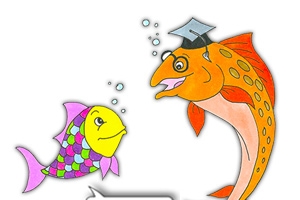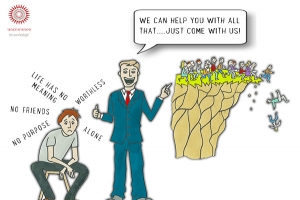Who Wouldn’t Want to Be More Charismatic?
7 research-based ways to be instantly more socially magnetic, attractive, and influential
 "Who Wouldn’t Want to Be More Charismatic?" courtesy of thesmuggler- Night of the Swallow
"Who Wouldn’t Want to Be More Charismatic?" courtesy of thesmuggler- Night of the SwallowIf you're in the market to be more charismatic, here's a riddle for you: What makes you attractive even if you're ugly? What moves people to take notice even if you're penniless? What invisible 'magic' can seduce, convince, inspire, and mesmerize others? You're ahead of me - it's charisma, of course. Like gravity, which cannot be seen but has powerful effects, we can't 'see' charisma but we know when someone has it.
Now: It's a sunny morning. Light is streaming through the windows. You're on campus. Earlier, you were tested for your 'charisma quota'. You're taking part in an experiment, but don't know it has to do with your charisma (or lack of).
After writing a detailed account of your mood, you're ushered into a room. You're left in there with a stranger for two minutes. The rules of the study determine that you cannot speak to one another, but you watch your 'partner' and they watch you. When the two minutes are up, you'll again be asked to describe your mood.
Okay, so you're not part of this experiment, but many people were. And what this study tells us about the sheer power of charisma will blow you away.
Your charisma: Making others feel better (or worse)
Psychologist Howard Friedman devised a test to gauge charisma levels – or, to what extent you 'send emotions' (1). Questions included how loud you tend to laugh, whether you confidently flirt, whether you find it hard not to tap your toes to the sound of good music, and so forth. The very top scorers gained 117 points, with the average score around 71 points.
Friedman then conducted the fascinating experiment I described above. He picked a few dozen people who had scored very high on the test, above 90 points, and a few dozen who had scored very low, below 60 points. They were all asked to fill out a questionnaire measuring how they felt at that instant.
He then put all the high scorers in separate rooms and paired each of them with low scorers. When the two minutes were over, they were both asked again to fill out a detailed questionnaire about how they were feeling. Friedman found that charismatic people are emotionally contagious because of their unusual capacity to 'infect' other people with the emotion they themselves are feeling. (This is why inspirational speakers are always charismatic.) After two minutes, even without speaking, the low charismatic had picked up the mood (happy, sad, irritable, mischievous) of the high charismatic, but the high charismatic never picked up the mood of the low charismatic!
Charisma: The golden edge
Highly charismatic people are:
- Considered 'strangely attractive' (even if their looks aren't great).
- Able to lead others naturally in thought and action.
- Able to influence and persuade others.
- Able to get dates.
- Popular.
- Able to make an impression on first meetings and be remembered.
- Able to make other people feel happier or sadder just by being close to them.
Charismatic people vary their voice tone, have expressive eyes, understand the emotions of other people, and have energy and focus (passion is infectious).
Let these tips work for you and, who knows? You may start wielding more influence and become more popular. So how can you be more charismatic? First up:
1) Be more expressive – say it like you mean it
Well, makes sense, doesn't it? If charismatic people express more through their movement, expressions, voice, and eyes, then learning to be more expressive will instantly make you more charismatic. Remember: charisma amounts to emotional infectiousness. Smile more; use the 43 muscles in your face. Take acting lessons and start to project your voice. Learn to love language and sculpt words in such a way that when you speak, people listen. Inject energy into your communication.
Watch how charismatic people hold other people's attention - how they express energy though their face and eyes, how they speak, and what they say.
2) Inject a little colour
What's the opposite of charismatic? Flat expressionless face, dull monotone voice, predictability, routine, habit in short? No surprises.
People are more engaged with you when they don't necessarily know what's coming next. Use humour. Change the pitch and volume of your voice, and practice using it intensely sometimes.
People who flirt well are charismatic (seduction isn't just sexual; we can be seduced by any kind of idea). A flirtatious person sends dynamic emotional signals that are intense and focused. When someone is being really flirtatious, their voice may become husky or they may even whisper sometimes. Be creative and vary the way you deliver your communication on all levels.
3) Paint pictures in people's minds (hypnotize 'em ;-) )
Charismatic people inspire emotion and feeling in other people. The way you use language is important. Don't just deliver words to impart information and facts; rather, use them to create experiences in the mind of your listener. Doing this makes you instantly more charismatic.
"I went on a ship; there was a storm" relays facts, but consider: "The ship was immense, totally black. As we travelled forwards, we could feel the waves powerfully rolling, so it was difficult to walk on deck. I could taste salt on my lips and feel the spray from the ocean on my face. And you should have heard the screams all around!" Charismatics involve you; they create an atmosphere, tension, and excitement through their descriptive power. Don't just tell me what happened; help me experience it by telling me the sounds, smells, tastes, sights, feelings, and textures involved in the experience.
All language can potentially induce altered states of consciousness in other people (hence 'hypnotic language'). Use all the senses in your descriptions to super-enhance the impact of your language.
4) Project a little 'presence'
What does it mean when we describe someone as having presence? Well, just the fact that they are here has an impact on the atmosphere. This is because of a certain personal authority and self-confidence which is picked up subliminally by others. So how does this confidence manifest?
Charismatic people decide for themselves what is funny, interesting, useful, and so forth. They don't follow trends of thought or fashion mindlessly - they tend to be creative and set an example for others to follow.
Sure, take advice from sources you decide are worth listening to (only an idiot doesn't do this), but always consider what you think and develop the confidence to describe your take on things authoritatively, regardless of what you worry is the 'right thing' to think or say. Charisma is a by product of confidence, energy, creativity, and self-assurance.
Now the next tip seems to contradict this one, but it doesn't at all...
5) Inject a little intrigue
When we say that someone has 'a certain something', ever noticed how that something can never really be described? I don't want you to withhold everything about yourself or suddenly make out like you're a secret agent, but silence can have power.
You don't always need to be spouting your opinions about everything or shouting the loudest. Silence on occasion holds power and dignity. By keeping a little mystery about yourself, you are not 'trying to be charismatic'; all you are doing is keeping a little back (in a world in which we're all encouraged to spill everything about ourselves to everyone, even on national TV). Attention seeking, shouting louder than the next guy, and telling every stranger your life history may make you something, but it won't be charismatic.
6) Dare to be different
Charismatic people almost by definition are strong enough to be like they truly are. They don't have to go with the crowd (or always have to go against the crowd for the sake of it), and they don't try to be someone they're not or be like someone else. They will be individualistic, think for themselves, and have a unique style. Think of the most charismatic individuals you know (or know of). They are not carbon copies of anyone else. They are not copycats or mimics trying to be what they aren't. They stand alone for who they are. And that's what makes them seem so confident.
Young people will often hopelessly adopt the dress, expressions, and behaviour of their idol, hoping to become as charismatic in the same way. But to be charismatic, you need to be who you are, not a weak imitation of someone else. Bruce Lee had charisma, a sense of presence, and personal authority; the thousands who copied him immediately after his death (think 'Bruce Li') did not. Elvis imitators can never be as charismatic as the King himself (because they are imitators).
7) Focus on others
"When I left the dining room after sitting next to Mr. Gladstone, I thought he was the cleverest man in England. But after sitting next to Mr. Disraeli, I thought I was the cleverest woman in England." - A woman when asked her impression of the two English statesmen Benjamin Disraeli and William Gladstone after dining with them.
That's right; being charismatic and influential isn't all about you. Some of the most persuasive and expressive people on Earth (advertisers) know how to appeal to you by talking about...you. The best charismatic people have emotional intelligence. They are not egoists always showing off. Charismatic people get you feeling good about them because they get you feeling good about you.
So be interested, comment on what others tell you, focus on connecting, and relax and have fun.
Above all, don't try too hard to be more charismatic. Focus on these tips until they become second nature, and then relax. Other people can almost smell desperation, and desperation is never magnetic.
You can have the greatest ideas in the world, but unless you become a credible vehicle for them, people may not take notice. Happy communicating. : )
References
- Friedman, who developed the Affective Communication Test, used by some firms to measure employee charisma, wrote us to say the test identifies those who "are generally popular (even if they are shy) and influential, because of their ability to transmit emotions through nonverbal cues."






